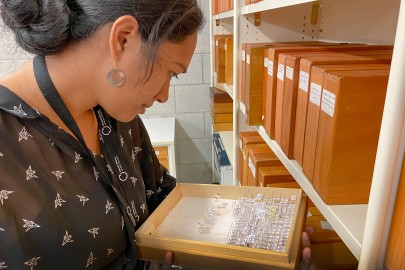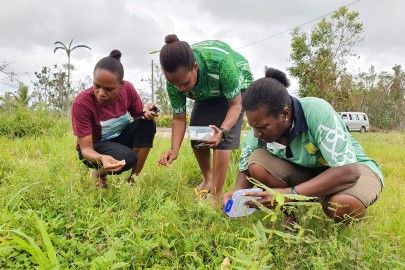
Loisi Taufa from Tonga looks through specimens, including many from the Pacific Islands, held in the New Zealand Arthropod Collection (NZAC) during a NENS workshop held in Auckland recently.
Our international work is an extension of our work in Aotearoa New Zealand and develops capability within governments, research institutes, and civil society.
The Manaaki Whenua Weed Biocontrol Group, for instance, has extended its expertise overseas, working with biosecurity teams across the Pacific as part of the collaborative Managing Invasive Species for Climate Change Adaptation in the Pacific (MISCCAP) resilience-building programme, funded by the Ministry of Foreign Affairs and Trade (MFAT).
The Secretariat of the Pacific Regional Environmental Programme (SPREP) and the New Zealand Department of Conservation are also contracted parties in the MISCCAP project.
Some – but not all – of our collaborative projects are outlined here. Each of these has involved intense periods of activity, including building relationships, undertaking surveys, providing training, and determining work plans and priorities.
Natural enemies, natural solutions

Team members from Biosecurity Vanuatu releasing parthenium beetles (Zygogramma bicolorata) just a few days after Tropical Cyclone Kevin.
Eight countries in the Pacific will introduce natural enemies in order to reduce the impacts of key weeds in the island nations under the umbrella of Manaaki Whenua’s ‘Natural Enemies – Natural Solutions’ (NENS) programme.
The Cook Islands were the site of the first major release of biocontrol agents, specifically for the African tulip tree (Spathodea campanulata). Introduced to many Pacific islands as an ornamental plant, the trees pose a huge threat to island biodiversity across the region. Native to tropical Africa, this fast-growing, evergreen tree infests rainforests, out-competes native vegetation, and affects agricultural production.
Biocontrol agents include African tulip tree flea beetles (Paradibolia coerulea) and gall mites (Colomerus spathodeae), which are both specialist natural enemies of the African tulip tree. The beetles feed on the leaves and the mites form leaf galls, known as erinea, which stunt new growth. Working together, these two natural enemies will reduce this invasive tree’s competitive ability. This work is being undertaken with assistance from the National Environment Service, the Ministry of Agriculture, and members of the Te Ipukarea Society and the Natural Heritage Trust.
The mites have also been supplied to Tonga and Vanuatu. The mites were establishing well in Vanuatu prior to Cyclones Judy and Kevin, which stripped the leaves from many trees, including the African tulips. However, Biosecurity Vanuatu kept a colony of mites safely under cover and they will be used for further field releases, if necessary.
African tulip tree was also determined to be the top priority for Fiji, where the NENS team of Lynley Hayes, Dr Quentin Paynter, and Temo Talie ran a weed prioritisation workshop with representatives from a range of government and regional institutions, including Fiji’s Biosecurity Authority, the Department of the Environment, The Pacific Community, the University of the South Pacific, and Fiji National University.
They also conducted fieldwork and natural enemy surveys, collected samples for molecular work, and visited academic institutions. Staff at the Ministry of Agriculture at Koronivia Research Station, in Suva, will support the work needed to import, mass rear, and release the African tulip tree mite and beetle.
While delivering the African tulip mites to Vanuatu, Manaaki Whenua researchers also visited the Vanuatu Agricultural Research and Technical Centre to view trials underway to optimise conventional control of wild peanut (Senna tora). This work will help farmers while natural enemies are being sought for this key pasture weed. The team provided training on how to analyse photos using software, which will be needed to assess the trials and other future project activities.
The NENS team has also begun research and risk assessments into the shrub Solanum torvum (known by many names, including pico and prickly solanum), which is having a major impact on the beef industry in Vanuatu. Native to the Antilles, this prickly shrub can form dense, impenetrable thickets.
Our recently completed molecular study has shown that populations of S. torvum in the Pacific are genetically very similar and originate from the Antilles, confirming the Caribbean to be the best place to look for natural enemies. Testing of a pico beetle (Leptinotarsa undecimlineata) obtained from Jamaica has ended, and since the beetle is both damaging and highly host specific, an import risk assessment is now being prepared for Vanuatu.
MFAT is also supporting the work to develop natural enemies for pasture weeds in Vanuatu in another project, ‘Improving Productivity of the Beef Industry in Vanuatu’. This project is assisting with the release of natural enemies already available for pasture weeds. In recent months the nail grass psyllid (Heteropsylla spinulosa) and parthenium beetle (Zygogramma bicolorata) have been introduced to Vanuatu with the assistance of collaborators in Australia.
Capacity building
Lynley Hayes and Temo Talie ran a highly successful week-long training course in Auckland in January, a key output for the MISCCAP programme this year to upskill 16 collaborators from Fiji, Samoa, Tonga and Vanuatu in all aspects of the NENS programme for weeds. The workshop also touched on related topics, such as dealing with the media, presentation skills, health and safety, and raising awareness of the Pacific material held in our Nationally Significant Collections.
Manaaki Whenua’s biological collections are not only the repository of knowledge of New Zealand’s flora and fauna, but they also contain specimens collected from the wider Pacific, making them an internationally significant research resource. Making these databases, such as the New Zealand Arthropod Collection (NZAC) - Ko te Aitanga Pepeke o Aotearoa available to Pacific Communities is a priority for Manaaki Whenua.



Creating sustainable seed and plant material systems
Manaaki Whenua is collaborating in six Pacific countries on seed and plant material systems. This work is crucial to ensure sustainable food production in the face of natural disasters and climate change, and to improve the health of Pacific people by broadening their crop diversity.
The Pacific Seeds for Life (PS4L) initiative began in 2020 with the aim of building a resilient and diverse portfolio of high-quality plant genetic resources for farmers and growers that would be available at all times.
In Vanuatu we’ve been working with the ‘Seeds for Life’ team, visiting project activities with local teams in Efate, Espiritu Santo, and Malekula to confirm plans and activities for the next 12 months.
Farmers in remote locations are training in seed saving, new plant varieties, organic production, subsistence agriculture, and agribusiness opportunities. The MFAT-funded programme is also funding seed storage facilities at the provincial level to ensure plant materials can be readily conserved and then shared in times of recovery after adverse weather events.
The Centre for Pacific Crops and Trees in Suva, Fiji, is a one of these genebanks, and it holds the largest collection of taro varieties in the world. Manaaki Whenua facilitates the efficient screening of viruses in these different taro varieties and helps to keep the collection disease-free.
Healthy taro seedlings are distributed to farmers around the Pacific region, contributing significantly to food security in the area.
